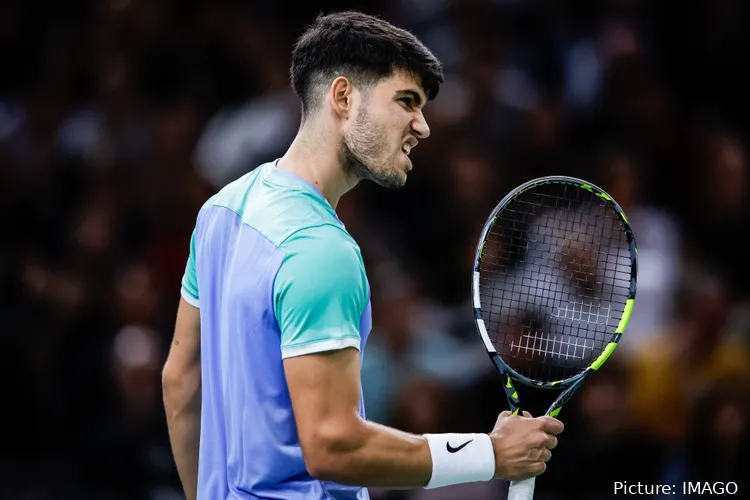
In a thrilling match at the 2024 Paris Masters, Ugo Humbert delivered a stunning upset over Carlos Alcaraz, advancing to the tournament’s quarter-finals with a level of play that left fans and analysts in awe. Despite entering the match as a clear favorite, Alcaraz found himself outplayed by the Frenchman, who seemed right at home on the fast indoor court at the Accor Arena in Bercy, Paris. Reflecting on his performance and Humbert’s stellar showing, Alcaraz expressed both admiration for his opponent and frustration with the tournament conditions, which he described as unusually fast.
Humbert’s performance was a masterclass in aggressive, high-energy tennis. The Frenchman, known for his powerful groundstrokes and effective serves, capitalized on his home advantage and displayed remarkable precision. Alcaraz, who has had an incredible season and was one of the favorites for the Paris Masters title, acknowledged Humbert’s dominance, stating, “I think I could play better, that’s obvious. But with the level I had today, I think I competed and gave everything. I fought until the last point… Ugo played incredibly well. The way he hits the ball is unbelievable. Every time he plays against me, I feel like he raises his level, especially in Paris.” Alcaraz’s respect for Humbert was evident as he congratulated his opponent and wished him luck in the next rounds.
Humbert’s ability to rise to the occasion, particularly in his home country, has not gone unnoticed. Playing in front of a supportive Parisian crowd seemed to elevate his confidence, and his aggressive style of play was a perfect match for the court’s pace. “When Ugo plays at this level, he’s very hard to beat,” Alcaraz admitted. “In Paris, even more so.” Humbert’s victory over the world-class Alcaraz adds another remarkable win to his career and has fans speculating about how far he can go in the tournament.
However, beyond the praise for Humbert, Alcaraz’s post-match comments also highlighted his discomfort with the conditions at the Accor Arena. The Spaniard questioned why the courts had been made so fast, labeling them as “crazy” in comparison to previous years. “It’s very difficult to play in these conditions,” he explained. “For my level, I try to adjust as much as I can to this court, to this speed. I thought it suited my game well, but it doesn’t. Playing against someone like Ugo, who keeps the pace flat and doesn’t let you get into any rhythm, makes it tough.” He described the court’s speed as the fastest he’s experienced in a Masters 1000 tournament, noting that it might even be the quickest indoor court he has encountered in a decade.
Alcaraz went on to clarify that he wasn’t trying to make excuses for his loss but expressed genuine bewilderment at the significant change in court speed. “This isn’t just about indoor courts in general,” he elaborated, “but this specific court. I don’t want it to sound like an excuse; Ugo deserves this win, and that’s obvious. But when I played my first match here, I saw stats that said this is probably the fastest Masters 1000 court, maybe even the fastest on tour right now. That’s crazy. I just don’t understand why they decided to make it so much faster than in previous years.”
In contrast, Alcaraz pointed out that he’d played on an indoor court recently during the Davis Cup, and the surface was much slower. The Spaniard’s remarks reflect the challenges players face when tournament conditions vary widely from venue to venue. Many players fine-tune their games and adapt strategies based on known court speeds and other environmental factors. For Alcaraz, this sudden shift in conditions at the Paris Masters was a major hurdle. “It surprised me a little,” he admitted. “I came here with only a few days to prepare. Maybe I should have come earlier to adapt, but that didn’t happen.”
This year’s tournament in Bercy is also significant as it marks the last time the Paris Masters will be held at the Accor Arena. From next year, the event is set to move to a new location in La Nanterre, a suburb just outside of Paris. This shift in venue has sparked speculation about whether the new location will offer more standardized conditions or if organizers will continue to experiment with changes in court speed and other factors to enhance the event’s distinctiveness.
Alcaraz’s reflections touch upon an ongoing debate in professional tennis about consistency in playing conditions. While minor variations in court surface, speed, and temperature are to be expected across different tournaments, significant shifts can disrupt a player’s rhythm and preparation, particularly when tournaments fall back-to-back on the ATP calendar. Alcaraz’s situation underscores the challenges of balancing adaptability with preparation in the professional circuit.
Looking forward, Humbert’s run at the Paris Masters has undoubtedly been boosted by his comfort on this faster surface, and his form could carry him deep into the tournament. For Alcaraz, despite the loss, the tournament was another valuable learning experience, as he continues to solidify his reputation as one of the most dynamic and talented young players on the tour. Though frustrated, he demonstrated sportsmanship and resilience in recognizing Humbert’s achievement, adding to the respect he commands within the tennis community.
Alcaraz concluded his remarks on a reflective note, acknowledging the need to embrace each challenge the tour presents. “All I can say is I don’t fully understand why they made the changes this year, but I’ll learn from this. I fought hard, and that’s what matters.” Alcaraz’s candid and humble response to the loss shows his maturity and commitment to improvement, even when faced with unexpected obstacles. As the season progresses, he remains one to watch, ready to adapt and refine his game in pursuit of continued success on the ATP Tour.
Leave a Reply